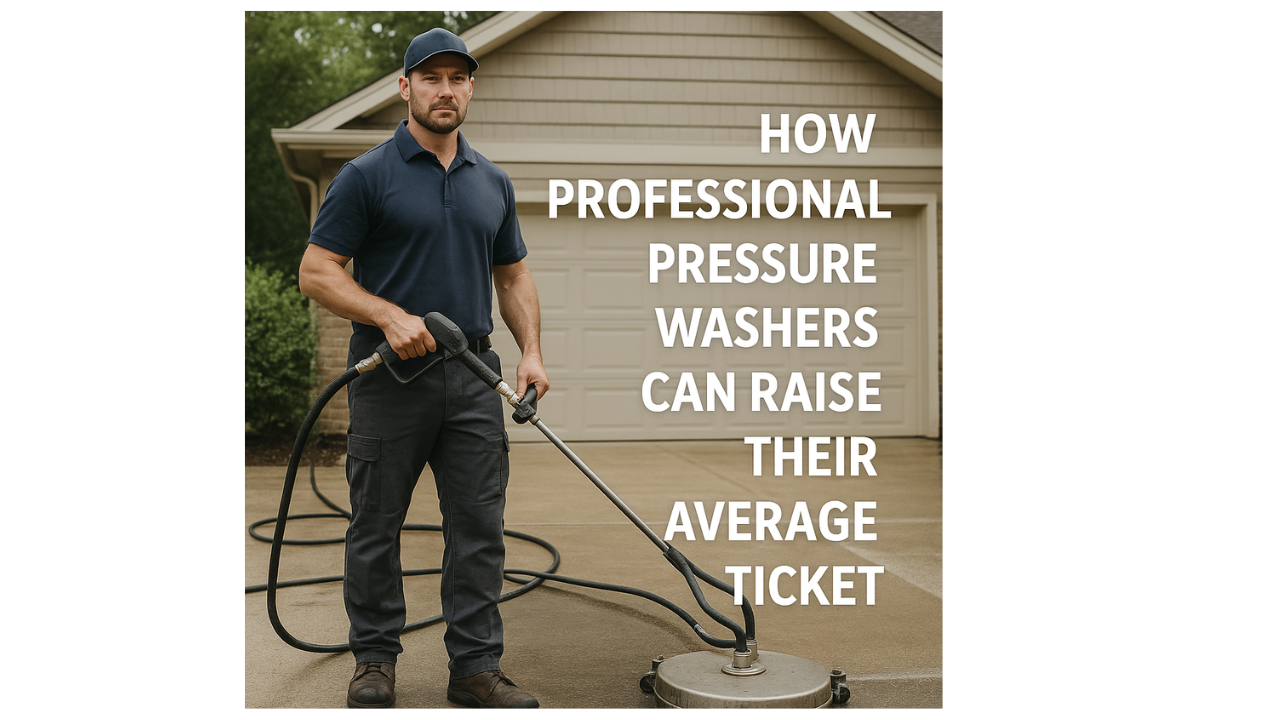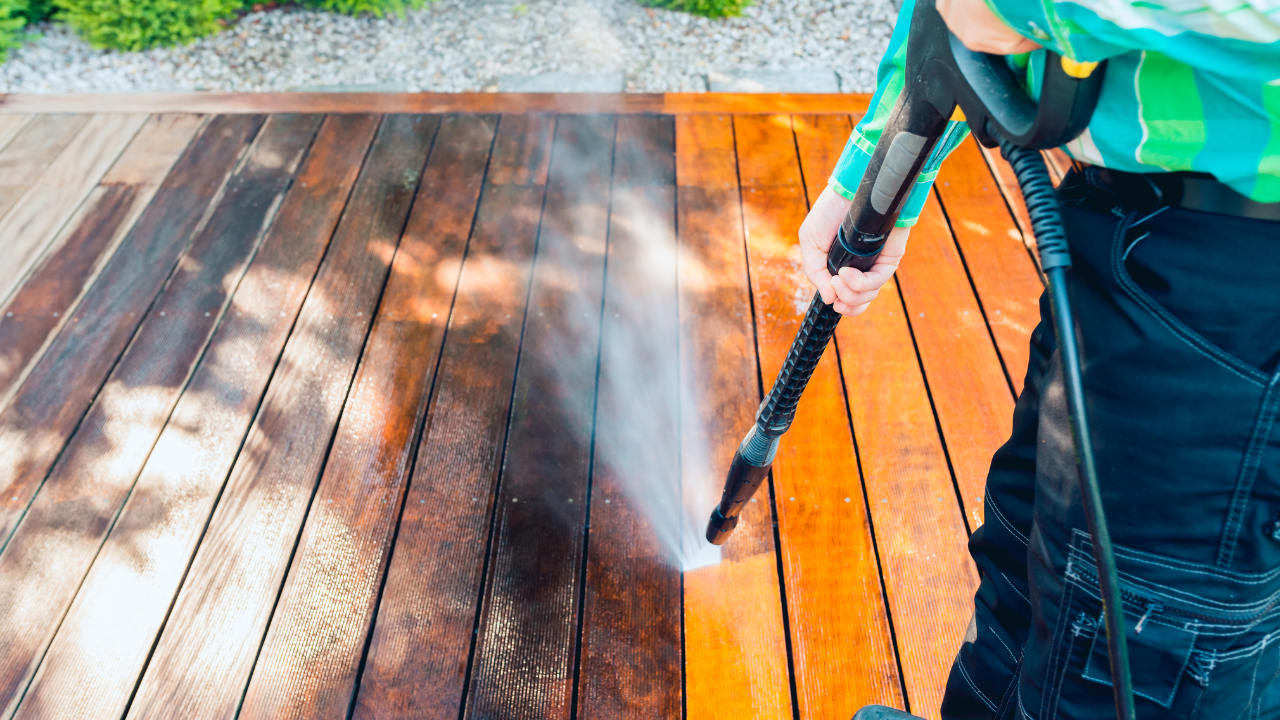How Professional Pressure Washers Can Raise Their Average Ticket
May 02, 2025
In the service industry, particularly in pressure washing, raising your average ticket is key to scaling your business profitably. It’s not just about cleaning surfaces—it’s about building confidence, shifting your mindset, creating outstanding customer experiences, and positioning yourself as a premium provider. Whether you're just starting out or are a seasoned pro, this guide will show you how to increase your average ticket to $1,500 and beyond.
The First Step to Higher Tickets: Shift Your Mindset
Your mindset is the first—and most important—barrier to overcome. If you believe that your local market won’t pay premium prices, you’ll unconsciously sell yourself short. Your tone, body language, and language choices will reflect that disbelief.
Too many pressure washers hold themselves back with thoughts like, "No one around here pays more than $250 for a driveway" or "Customers only care about the cheapest price." These aren’t facts—they’re limiting beliefs.
Instead, start believing: "There are clients in my area who will pay more for quality," or "I offer peace of mind, convenience, and curb appeal that’s worth every penny." This is the mindset shift that leads to higher-value sales.
Stop Projecting Your Wallet Onto Your Clients
Your financial situation isn’t the same as your customer’s. Many pressure washers hesitate to charge premium rates because they themselves would never pay that much for the service.
But remember, your customer might be earning six figures or more. They value their time. They don’t want to waste weekends pressure washing their house or driveway—and they don’t want to deal with amateurs. When you communicate the convenience, reliability, and transformation you offer, your pricing will make sense to them.
Learn to Sell With Confidence and Emotion
Selling high-ticket pressure washing jobs isn’t about quoting square footage—it’s about conveying emotion and confidence. When your customer feels connected to the result and believes in your professionalism, they’re far more likely to agree to your pricing.
Ask emotionally driven questions like, "What do you want your home to look like when guests arrive?" or "Do you want your house to be the cleanest one on the block for your next gathering?" These prompt clients to think about how your service fits into their lifestyle, not just what it costs.
Use assertive, positive language. Instead of saying, “We can come out next week,” say, “Once you choose your package, we’ll schedule your cleaning for Thursday.” This projects confidence and authority.
When offering services, present them as bundled packages. For example, offer a basic house wash, then upsell with add-ons like driveway cleaning, deck restoration, or gutter brightening. Packages make decisions easier and encourage clients to choose higher-value options.
Practice Sales Daily
Sales skills can be learned and improved over time. Make daily practice part of your routine. Rehearse common objections. Role-play quotes with a colleague. Record your conversations and review them for weak points.
Use tools like ChatGPT to simulate customer scenarios and generate better responses. Work on your delivery—body language, tone, and pacing all play a huge role. Remember, only a small part of communication is about the actual words. Confidence shows in how you carry yourself.
Handle Objections Without Discounting
When a customer objects to your price, don’t rush to discount. Instead, probe deeper to understand their concern and reframe the conversation around the benefits they care about.
If someone says, “That seems high,” respond with, “I understand. But you mentioned that you want your home to look its best for your daughter’s graduation party. This will absolutely help create that clean, fresh impression.”
When you discount too quickly, you signal that your price wasn’t justified to begin with. Stand firm in your value.
Position Yourself as the Local Expert
Being seen as the expert in your area changes everything. People stop price shopping and start trusting you based on your reputation.
Make sure your branding is clean and professional—uniforms, wrapped vehicles, and branded gear go a long way. Have a polished website with testimonials and high-quality before-and-after photos.
Showcase your work on social media and Google My Business. Get involved in your community. Sponsor local events or do charity cleanups that generate goodwill and recognition.
Qualify Leads Without Scaring Them Off
Screening your leads helps you avoid time-wasters, but you need to phrase it the right way.
Instead of saying, “We don’t do jobs under $300,” try, “Our packages start around $300 depending on the scope, and we tailor each one to your specific property and needs.” This positions you as a service provider—not a commodity.
Stop Selling Cleaning, Start Selling Transformation
Homeowners aren’t paying you to clean their siding. They’re paying for the pride of a fresh-looking home, the curb appeal that impresses neighbors, and the stress relief of checking off a major to-do item.
Shift your sales pitch from task-oriented to result-oriented. Talk about the fresh, welcoming feel their home will have. Talk about how it adds value before a sale. Talk about how good it feels to not worry about algae, mold, or a dirty driveway anymore.
Build Confidence With Wins and Testimonials
Before reaching out to a prospect, read your latest five-star reviews. Remind yourself that your service makes a difference. Let that energy carry into your next conversation.
If you’re new to the business, start by gathering feedback from early jobs—friends, family, or discounted first clients. Document these wins and share them on your website and socials.
Confidence isn’t luck. It’s built by acknowledging your progress.
Learn How Affluent Clients Think
Affluent homeowners think differently. They want service, not hassle. They’re paying for their time, peace of mind, and status—not just the cleaning.
Focus on the aspects they care about: ease of scheduling, reliability, thoroughness, and a home that looks stunning year-round. When you understand their motivations, your value proposition will hit home.
Leverage Sales Psychology Techniques
Use effective techniques like anchoring—lead with your most expensive package first to make the others feel more reasonable. Practice assumptive closes like, “We’ll plan for next Friday unless another time works better.”
Use real stories. Share what other customers have said about how your work transformed their home and how happy they were with the result.
Follow Up Like a Pro
You won’t close every job on the first contact. In fact, most high-ticket sales happen after multiple touchpoints. Follow up consistently—by text, phone, and email.
Track leads in a CRM or spreadsheet. Don’t just remind them of the quote—remind them of the outcome. “Imagine pulling into your driveway and seeing your home shine again. That’s what we want to give you.”
Final Thoughts
Raising your average ticket in the pressure washing business doesn’t start with equipment—it starts with mindset.
Believe in your value. Master the emotional side of selling. Present professional packages, communicate confidently, and follow up relentlessly.
When you stop selling a chore and start selling a lifestyle upgrade, your clients will pay what it’s worth.
Don’t just clean surfaces. Transform homes. And start charging accordingly.
 https://www.kingofpressurewash.com/
https://www.kingofpressurewash.com/
1. What does “average ticket” mean in pressure washing?
Your average ticket refers to the average amount a customer spends per job. Increasing this means making more money per client, which helps you grow your business without having to take on more jobs.
2. How do I convince customers to pay more than the competition?
Focus on the value you offer: convenience, professionalism, high-quality results, and peace of mind. People pay more when they believe they’re getting more—and when you sell an outcome, not just a service.
3. What if I don’t feel confident charging higher prices?
Confidence comes from preparation. Practice your pitch, review customer testimonials, and rehearse sales conversations. The more you sell, the more natural it becomes. Confidence builds with repetition.
4. Should I offer itemized quotes or package pricing?
Package pricing is more effective. It simplifies decision-making and makes it easier to upsell additional services. Clients are more likely to choose higher-value options when you present them as part of a package.
5. How do I respond when someone says my price is too high?
Reframe the conversation. Remind them of the transformation your service offers. Ask what result they’re looking for, then explain how your service delivers that result—reliably and professionally.
6. How can I prequalify leads without sounding rude or pushy?
Use language that’s respectful and informative. For example, “Our projects typically start around $300 depending on the scope. We customize each package based on your goals and property.” This keeps you in control without turning people off.
7. Is it okay to do lower-priced jobs when starting out?
Not if it sets a low-value precedent. Instead, offer a few free or discounted jobs in exchange for testimonials and photos. Use those to build credibility while staying focused on long-term pricing goals.
8. What’s the best way to follow up with leads?
Use a CRM or simple spreadsheet to track quotes. Follow up by text, email, and phone. Make it personal and results-focused—“Just checking in to see if you're ready to make your home shine again.”
9. How can I position myself as the expert in my area?
Showcase your work consistently online. Build a professional website, get customer reviews, and post before-and-after photos on social media. Also, get involved locally—sponsorships and charity work help build authority.
10. How do affluent clients make decisions differently?
They value ease, reliability, and results. They’re not looking for the cheapest option—they’re looking for the best experience. Focus on emotional benefits like pride of ownership, curb appeal, and saved time.




